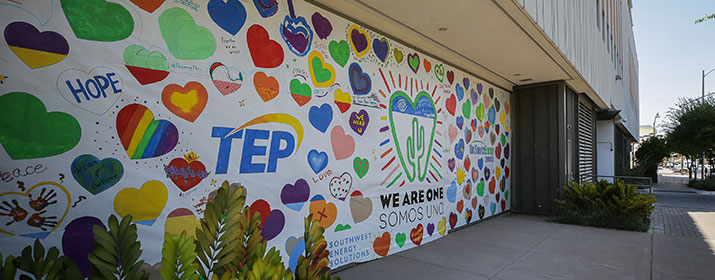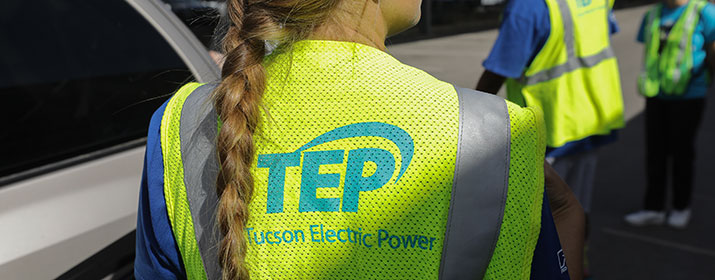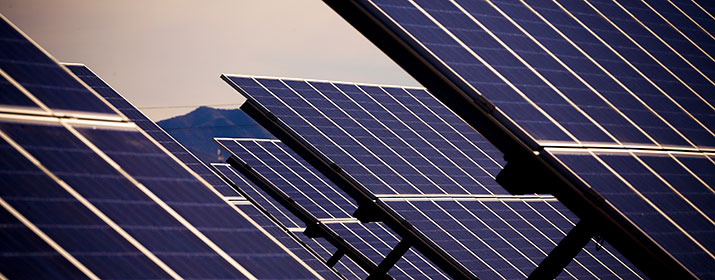
Four significant employers committed to establishing new businesses in our community with support from TEP and local partners in 2023.
That resulted in the creation of 430 jobs in Southern Arizona, advancing our efforts to promote local economic development. Since 2016, TEP has worked directly with businesses that have created nearly 22,000 local jobs.
The new businesses include a consumer products manufacturer, two logistics providers, and a technology company. These new businesses will make beer kegs, create luxury and fashion goods, and test autonomous vehicles, contributing to the diversity of our local economy.
The previous year, commitments from battery and related industries promised to significantly expand our region’s manufacturing base. American Battery Factory announced plans to employ about 1,000 people at a new 2 million-square-foot “gigafactory” in Tucson; it has since broken ground on the facility. Another local battery manufacturer, Sion Power, also announced plans to expand in 2022.
TEP collaborates with a regional team, comprised of city, county, state, and local business representatives, to promote the Tucson area to prospective employers. Outreach includes visits with business representatives as well as interaction with site selectors who help businesses identify locations that fit their needs.
“TEP directly supports our development partners to ensure that we provide the information and engagement that companies need to make informed decisions. By putting our best foot forward, we increase our chances of landing new customers and fostering economic development,” said Matt Miller, TEP’s Principal of Economic Development.
Miller said the Tucson metropolitan region has a strong industrial base in advanced manufacturing, natural resources, clean technology, the biosciences, and innovation with assets that include the University of Arizona. Additionally, the region has strong logistical and connectivity advantages with Interstate 10, the Port of Tucson’s intermodal facilities, Tucson International Airport, and close proximity to Mexico.
“As a result of these advantages and the efforts by state and regional leaders and partners, local economic development pipelines are growing significantly,” Miller said.
The largest new business was MicroStar Logistics, which selected Tucson for an international logistics operation serving Mexico and the United States. The operation, which manufactures kegs and manages logistics, plans to add 243 jobs to the region. Read the press release from Sun Corridor Inc.
“We thank MicroStar for its confidence and investment in Tucson and Southern Arizona,” said Susan Gray, TEP’s President and Chief Executive Officer after the July announcement. “Our CEOs across the region stand ready to assist them and look forward to the company’s long-term prosperity here in the Tucson region.”
When the announcement was made, Glen Opp, Chief Operating Officer and President of MicroStar’s Network Services Division, said the facility will help strengthen the company’s business position.
“This state-of-the-art facility further supports the beer industry’s commitment to quality,” Opp said in the Sun Corridor Inc. press release. “In Tucson we are leveraging this expertise to manage, clean and maintain the highest-quality fleet of reusable pallets.”
The three other businesses that announced new locations or expansions in 2023 were:
- Chrome Hearts – 147 jobs. The Los Angeles-based luxury goods and fashion company is expanding manufacturing operations, where it will produce jewelry, apparel, furniture, and high-end accessories. The business purchased a 40-acre site and a 117,000-square-foot building on South Rita Road.
- Total Quality Logistics – 30 jobs. The second-largest freight brokerage in North America and one of the largest global third-party logistics firms expanded with a new office in Tucson.
- ai – 10 jobs. The global autonomous driving technology company is partnering with Pima Community College and will base its operations at the Downtown Campus’s Automotive Technology & Innovation Center.






